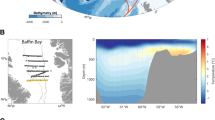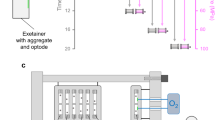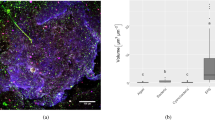Abstract
Fragile aggregate particles, or ‘marine snow’, were collected by SCUBA from coastal surface waters using trace metal-free techniques, and their primary production (rates of photosynthesis by associated phytoplankton) was determined relative to corresponding water column production. Primary production associated with these particles was found to range from 11 to 58% of total production, indicating that large particles can have an important role as major sites of primary production in the marine environment. Our results suggest that the use of water bottles to collect samples for productivity measurements may not sample large particles adequately in certain conditions, and thus may lead to underestimates of primary production.
This is a preview of subscription content, access via your institution
Access options
Subscribe to this journal
Receive 51 print issues and online access
$199.00 per year
only $3.90 per issue
Buy this article
- Purchase on Springer Link
- Instant access to full article PDF
Prices may be subject to local taxes which are calculated during checkout
Similar content being viewed by others
References
Riley, G. A. Limnol. Oceanogr. 8, 372–381 (1963).
Alldredge, A. L. Limnol. Oceanogr. 21, 14–23 (1976).
Gilmer, R. W. Science 176, 1239–1240 (1972).
Gordon, D. C. Deep-Sea Res. 17, 175–185 (1970).
Hamner, W. M., Madin, L. P., Alldredge, A. L., Gilmer, R. W. & Hamner, P. P. Limnol. Oceanogr. 20, 907–917 (1975).
Trent, J. D., Shanks, A. L. & Silver, M. W. Limnol. Oceanogr. 23, 626–635 (1978).
Alldredge, A. L. Limnol. Oceanogr. 24, 855–866 (1979).
Shanks, A. L. & Trent, J. D. Limnol. Oceanogr. 24, 850–854 (1979).
Silver, M. W., Shanks, A. L. & Trent, J. D. Science 201, 371–373 (1978).
Martin, J. H. & Knauer, G. A. Geochim. cosmochim. Acta 37, 1639–1653 (1973).
Alldredge, A. L. & Cox, J. L. J. mar. Res. 40, 517–527 (1982).
Fellows, D. A., Karl, D. M. & Knauer, G. A. Deep-Sea Res. 28 A, 921–936 (1981).
McCave, I. N. Deep-Sea Res. 22, 491–502 (1975).
Lal, D. Science 198, 997–1009 (1977).
Bruland, K. W., Franks, R. P., Knauer, G. A. & Martin, J. H. Analyt. chim. Acta 105, 233–245 (1979).
Fitzwater, S., Knauer, G. A. & Martin, J. H. Limnol. Oceanogr. 27, 544–551 (1982).
Knauer, G. A. & Martin, J. H. Limnol. Oceanogr. 26, 181–186 (1981).
Author information
Authors and Affiliations
Rights and permissions
About this article
Cite this article
Knauer, G., Hebel, D. & Cipriano, F. Marine snow: major site of primary production in coastal waters. Nature 300, 630–631 (1982). https://doi.org/10.1038/300630a0
Received:
Accepted:
Issue Date:
DOI: https://doi.org/10.1038/300630a0
This article is cited by
-
Structural and chemical analysis of marine aggragates: in situ macrophotography and laser confocal and electron microscopy
Marine Biology (1996)
-
Killing of marine phytoplankton by a gliding bacterium Cytophaga sp., isolated from the coastal sea of Japan
Marine Biology (1993)
-
Some characteristic features of large amorphous particles (NUTA) in the seto Inland Sea, Japan
Journal of the Oceanographical Society of Japan (1991)
-
Discriminate feeding of the calanoid copepod Acartia clausi in mixtures of phytoplankton and inert particles
Marine Biology (1987)
-
Interactions of detrital particulates and plankton
Hydrobiologia (1985)
Comments
By submitting a comment you agree to abide by our Terms and Community Guidelines. If you find something abusive or that does not comply with our terms or guidelines please flag it as inappropriate.



